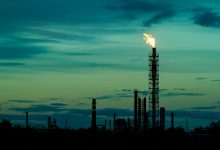Global emissions of potent greenhouse gas methane have surged to new record levels and are on track for some of the worst global warming scenarios, a new research report has warned.
New research, published in the journal Earth System Science Data, has warned that unless methane emissions are substantially reduced, the world could be on track for 3 to 4 degrees of global warming before the end of the century.
The researchers said that growth in emissions from fossil fuel use and agriculture, both human caused sources of methane emissions, were to blame for the rise in emissions.
Methane is a potent greenhouse gas, with a tonne of methane contributing to 28 times more to global warming than a tonne of carbon dioxide, over a 100 year period.
The study estimated that around two-thirds of all global methane emissions attributable to human activities are caused by the agriculture sector with most of the remaining methane emissions being released by the fossil fuel sector.
These sectors had been equally responsible for increases in methane emissions since 2000, according to the research.
The researchers singled out the growth in gas exploration in Australia, which has occurred rapidly over the last decade and which the Morrison government has encouraged to grow even further, as something that must be addressed if there is to be a change of limiting warming to below 2 degrees.
In the midst of the economic disruption caused by Covid-19, the gas lobby, particularly in Australia, has worked quickly to try and influence governments to embrace an expansion of the industry as part of a gas-led economic recovery.
“Natural gas use is rising quickly here in the U.S. and globally. It’s offsetting coal in the electricity sector and reducing carbon dioxide emissions, but increasing methane emissions in that sector,” lead author of the research paper, Rob Jackson of Stanford University, said.
“The U.S. and Canada are also producing more natural gas, and as a result, we’re emitting more methane from oil and gas wells and leaky pipelines.”
Citing a recent report by the Global Energy Monitor, the researchers highlighted the problems with expanded gas production, which has significant issues of methane leakage.
Compared to the early 2000s, annual methane emissions have increased by 9 per cent, and the growth in human caused emissions of methane has exceeded the ability for it to be absorbed through natural processes. This has led to an accumulation of additional methane in the atmosphere, contributing to global warming.
Researchers from the CSIRO’s Global Carbon Project, who co-authored the research paper, said that the growth in methane emissions since the turn of the century have been consistent with a warming trajectory of 3 to 4 degrees Celsius before the end of the century.
This is in line with some of the more pessimistic warming scenarios developed by the authoritative Intergovernmental Panel on Climate Change.
“Methane is now responsible for 23 per cent of global warming due to greenhouse gases, with emissions rapidly growing in many parts of Asia and the Americas,” member of the CSIRO’s Global Carbon Project Pep Canadell said.
“Dominant drivers of the increase of methane emissions are the expansion and intensification of agriculture, particularly livestock, and use of fossil fuels in South and southeast Asia, and China. For North America, we find that emission growth is dominated by the use of fossil fuels.”
In addition to the need to curb methane emissions from the fossil fuel sector, the researchers said that changes in agricultural practices would be necessary to reduce global emissions, which would likely require changes to people’s diets.
Due to the contribution that agricultural practises had in the production of methane, particular the raising of cattle for meat production, the researchers suggested that reduced global consumption of meat may be necessary, alongside reductions in fossil fuel consumption.
“We’ll need to eat less meat and reduce emissions associated with cattle and rice farming, and replace oil and natural gas in our cars and homes,” Stanford’s Rob Jackson added.
As most methane emissions are now attributable to human activities, the researchers argue that reductions in methane emissions must be the subject of increased attention, particularly if governments are genuinely looking to achieve the aims of the Paris Agreement on climate change.
“Methane offers a variety of immediate mitigation options to reduce emissions from fossil fuels and agriculture, and also through wetland restoration. Because it is short-lived in the atmosphere, we would see rapid climate benefits as we also tackle how to achieve net-zero carbon dioxide emissions,” NASA Goddard Space Flight Centre’s Ben Poulter added.









